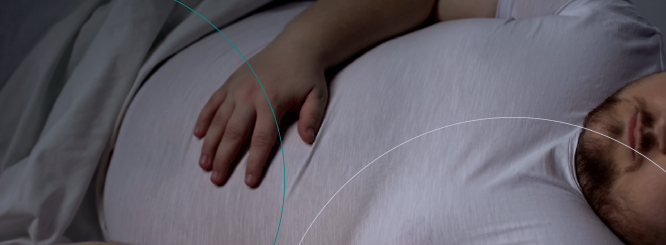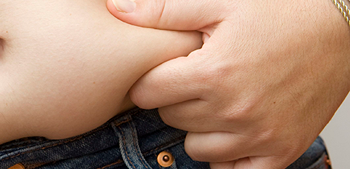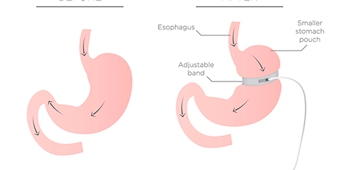
Weight loss surgery, such as the gastric sleeve surgery, is one of the most common bariatric procedures available for patients who are dealing with morbid obesity, hypertension, and type 2 diabetes. The postoperative recovery process takes several months and if the procedure goes over smoothly, the patient should expect positive results, as long as they also follow their doctor’s recommendations on how to take care of their body.
These recommendations following gastric sleeve surgery can include a determined resting period, prescribed medication, a specific diet, and removing certain habits from your daily life that could hinder your recovery. However, it’s important to keep in mind that gastric sleeve surgery can have potential complications during and after the procedure.
There are a lot of factors that determine which bariatric surgery is right for each patient, like their medical history, their needs and goals, and the amount of fat that needs to be removed from the body. To know if gastric sleeve surgery is right for you, your doctor will go over your specific case and perform an in-person examination in order to create a treatment plan to address your needs. Once it’s established, they’ll go over it with you so that you’re prepared, both mentally and physically, for what your body is about to go through during and after the surgery.
This means talking about the possible complications during or after the gastric sleeve surgery. To avoid or prevent them from happening, your doctor will give you a set of instructions that you have to follow, such as improving your eating habits, taking on a physical activity, and removing harming habits that may complicate not only your surgery, but your overall quality of life. However, there are some postoperative complications that may arise even if your surgery went smoothly, like obstruction of stomach, chronic nausea, and ulcers, just to mention a few.
Another complication or side effect is acid reflux and it’s important to keep it in mind in case you start experiencing it after your procedure.
Our team at LIMARP®, led by Dr. Liza María Pompa González, takes care of you on each step of the surgical process so that any arising complication can be treated effectively and safely. Postoperative care is part of the integrative treatment plans we offer, meaning that if you suffer any type of complication after your weight loss surgery, such as acid reflux, our team of multidisciplinary doctors are fully equipped to treat you and ensure that you recover successfully.
For this article we’ll talk about the possibility of having acid reflux after gastric sleeve surgery, how to identify it, and the available ways to treat it.
As always, we’d like to remind you that each case is different and that the information presented in this article may not apply to your specific situation. If you’ve recently had any type of bariatric surgery and are experiencing uncomfortable side effects or unmanageable pain, please contact your doctor right away or schedule a consultation at our Tijuana clinic.
Acid Reflux: What is it?
First of all, let’s talk about acid reflux. Acid reflux occurs when the sphincter muscle at the lower end of your esophagus relaxes at the wrong time, allowing stomach acid to back up into your esophagus. This can cause heartburn and other signs and symptoms and if it’s frequent, acid reflux can lead to GERD[1]. There are some weight loss surgeries, such as the gastric bypass, that can alleviate the symptoms of GERD or get rid of it altogether if the patient has been struggling with it prior to their surgery.
However, there have been some studies that found that acid reflux can develop or worsen due to gastric sleeve surgery[2]. This same study proposed some reasons as to why people can get acid reflux after gastric sleeve surgery, such as:
- The shape of the sleeve
- Damage to the lower esophageal sphincter
- The presence of hiatal hernia
When gastric sleeve surgery is performed, the pyloric valve is left intact, but the stomach is reduced significantly. Thus, the pressure within the stomach is increased, and the lower esophageal sphincter is the path of least resistance for excess pressure to dissipate; so when the pressure is released into the esophagus, stomach acid often accompanies it, causing acid reflux[3].
Acid reflux can be uncomfortable and even painful, and if it goes untreated it can cause more serious complications, such as irritation, esophageal ulcers, esophageal strictures, and Barrett’s esophagus, which can increase the chances of developing esophageal cancer.
How to Treat Acid Reflux After Gastric Sleeve Surgery
If the patient has a hiatal hernia, it’s very important to treat it in order to reduce the reflux to up to 20%. There are also medications that can help a patient manage their acid reflux, such as antacids, H2 receptor blockers, and proton pump inhibitors. If there are no signs of improvement and the acid reflux becomes unmanageable, your doctor may propose changing the gastric sleeve to a gastric bypass.
Contact Us to Learn More
If you want to learn more about acid reflux after gastric sleeve surgery, schedule an appointment with one of our doctors. We can help determine the right treatment for you. Contact us online anytime or give us a call at (619) 373-0229.
References
- [1] “Gastroesophageal reflux disease (GERD)”. https://www.mayoclinic.org/diseases-conditions/gerd/symptoms-causes/syc-20361940. (Accessed February 20, 2023).
- [2] Felinska E, Billeter A, Nickel F, Contin P, Berlth F, Chand B, Grimminger P, Mikami D, Schoppmann SF, Müller-Stich B. Do we understand the pathophysiology of GERD after sleeve gastrectomy? Ann N Y Acad Sci. 2020 Dec;1482(1):26-35. doi: 10.1111/nyas.14467. Epub 2020 Sep 6. PMID: 32893342.[3] “WHAT WE KNOW ABOUT REFLUX AFTER GASTRIC SLEEVE”. https://sampadocs.com/2019/12/23/reflux-after-gastric-sleeve/. (Accessed February 20, 2023).


